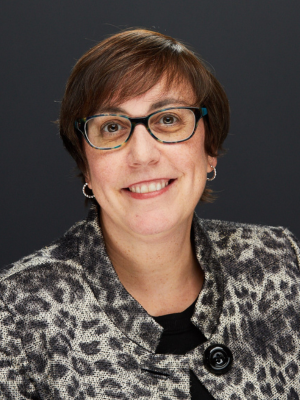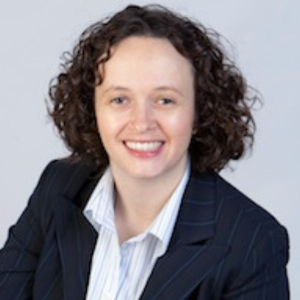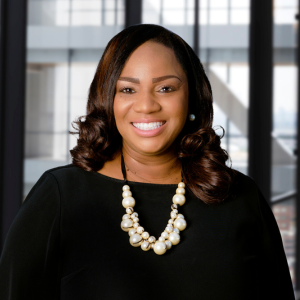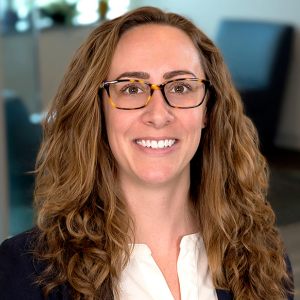Alexandra Tyler: Managing Director, Digital Transformation Leader, Accenture Song
 Removing my protective wall around my identity has enabled me to create deeper connections in my work and in building more meaningful relationships with my family and with my colleagues and clients,” says Alexandra Tyler. “The protective wall goes down, and it impacts everything, including being a better leader.”
Removing my protective wall around my identity has enabled me to create deeper connections in my work and in building more meaningful relationships with my family and with my colleagues and clients,” says Alexandra Tyler. “The protective wall goes down, and it impacts everything, including being a better leader.”
Curiosity and Customer-Focused Growth
Curiosity has driven Tyler’s career. She’s come across specific job positions by asking questions. “I’ve been lucky in that I’ve been able to pave my way in making my own adventure, essentially through conversations with people about open positions they had that weren’t quite right,” she reflects, “and in which we often crafted a new position that matched the needs of the business with my expertise and interests.”
Having studied psychology, she began her career in advertising, where she learned to appreciate the power of understanding what customers want and need.
“If you understand what customers want and need at every stage of their journey and are able to fulfill those needs and desired successes, you can enable growth,” she says. “What do those customers want to achieve and how do you develop the roadmap and path to get there? That is the opportunity. That’s why I’m excited about Gen AI and other innovative capabilities to unlock and enable more insights to meet customer needs.”
Being Focused on People’s Motivations
Growing up as a daughter of first-generation immigrants and raised by a father with a disability, Tyler understood the importance of two important lessons that he imparted: in order to succeed, one must persevere and exhibit true grit. In addition, one must celebrate differences in others.
“I feel strongly about focusing on doing right by others. Ambition goes awry if you don’t have respect for individuals, and if you don’t think about what motivates them,” she notes. “I want to understand what’s important to the people with whom I work. I focus on treating individuals how I would want to be treated – including respecting their differences, talents and expertise.”
In addition to treating her colleagues and team members with mutual respect, Tyler learned the importance of inspiring them to pair their great ideas with great follow-through: “I often see people who are incredible ‘ideators’ – who come up with innovative and breakthrough ideas – but they struggle with execution,” she observes. “The devil is in the details when it comes to lighting up an idea. It takes focus, management and collaboration.”
Freeing Herself To Show Up Fully
“It took me a long time to feel comfortable as an authentic leader. Growing up in the world I grew up in, as an LGBTQ+ individual, was challenging,” she notes. Recently at a bank branch, she saw a sticker related to the LGBTQ+ community about celebrating differences. It struck her to imagine the impact that seeing that message would have made early on in her career.
“When I first started my career, I was lying by omission, often doing what LGBTQ+ people do…not using pronouns for your partner. It’s only in the last ten years that I have been comfortable enough to be honest about who I am and to bring my full self to the equation.”
What you feel you cannot say begins to grow heavy and become a burden. Tyler imagines carrying a sixty-pound barbell all those years. “When I put that burden down visually in my head, it was exceptionally freeing,” she says. “When I freed myself of that burden, opportunities in my career opened up.”
For example, at a work town hall, Tyler recently shared her personal journey and the value of bringing her full self to work. She was commended by the head of her division for showing up as her true self and was applauded for doing so, exhibiting the traits of leadership that Accenture values.
“I cannot tell you how much positive feedback I received just for being true to who I am and being vocal about it,” says Tyler. “Leaders at Accenture have been phenomenal in recognizing the power in whatever differences you bring to work and the ability to bring your full self.” And sharing her experiences of exclusion has built bridges of empathy with others who have faced challenges. LGBTQIA+ peers have approached her inspired by her authenticity and, in turn, let down their own protective walls.
Advocating and Inspiring Others
“Freeing myself up to be myself empowered me to be an advocate for others. It is important for me to pay it forward by being an advocate in my community.”
Tyler is on the Board of Be The Rainbow, an LGBTQIA+ nonprofit organization in her Long Island hometown. On their third Pride March, Tyler is excited to be opening minds and hearts to create a greater platform of equity in which all can have a voice.
In her training and at work, Tyler’s approach is comprised of experimentation and optimization. She often tests the waters, dips her toe in, tries out different messages and approaches. What she found when she ‘came out’ is that the response was much more positive than she had anticipated. She encourages others to consider who they can safely share with – a person, a group – in order to build that positivity. Tyler acknowledges that the experience of speaking one’s truth, no matter the reaction, is alone invigorating and empowering.
The Intersection of Identity and Innovation
Tyler admires that her daughter’s generation wields identity and labels quite differently. “Labels are fluid and I know that my daughter and her friends are comfortable at the same time with no labels or multiple ones: Imagine what you could do if you were not carrying the burden of the sixty-pound barbell, or invisible burden, every day?”
At Accenture, Tyler is fascinated by the intersection of innovation and identity – particularly how removing obstacles around identity frees you up to create and innovate. She considers cryptanalyst Alan Turing (played by Benedict Cumberbatch in the film The Imitation Game) who developed the ability to decode messages and the predecessor to the computer, and who was also tortured for being homosexual.
“I think about what more amazing things he could have done. He was such an innovator, even with the constraints of conversion therapy and being tortured,” she notes. “What aperture could have opened if individuals like Turing could have been safe to express their identity freely? I’m interested in that tension for any minority who is held back because of societal constraints or one they put on themselves. I’m fascinated by the intersection of how innovative you are as a thinker and the ability to free yourself up to feel comfortable to think differently.”
Why Failure Is Growth
Early on in her career, Tyler worked on developing and launching a new product that consolidated all utility bills into one billing statement. For various reasons, after two years of pretests and pilots, the project failed to launch. But her functional leader was an innovator who believed in failing often and failing fast. Instead of berating the team, he applauded the risks and innovation and threw the team a “failure party” and handed out awards. The team received their best performance reviews that year.
“I learned the importance of reinforcing that failure can actually spur innovation,” says Tyler. “I was very lucky to find leaders that encouraged failing. I know that it may sound trite but, to me, the age-old notion that failure begets growth is very true.”
As a result, Tyler encourages her teams to take calculated risks and experiment: “It’s okay to fail because you learn and those learnings bring you closer to success. Because you WILL eventually succeed. Perfection at the sake of innovation is failure in itself. You must try and also not be afraid to be curious, and that effort and curiosity are successes in themselves. ”
Tyler has two daughters, 15 and 18, a freshman in high school and college, respectively. Her wife, Beth, is a special education teacher in Queens. Recently, her oldest daughter “failed” to get into her first college choice. After the initial disappointment, she applied to an array of different schools that she would otherwise not have considered. She now feels “at home” at UNC Chapel Hill where she is thriving – an example of how failure can lead to the growth you didn’t see coming.
To be surrounded by her family and watch them grow are her greatest successes, and Tyler now embraces sharing those successes with others.
By Aimee Hansen










